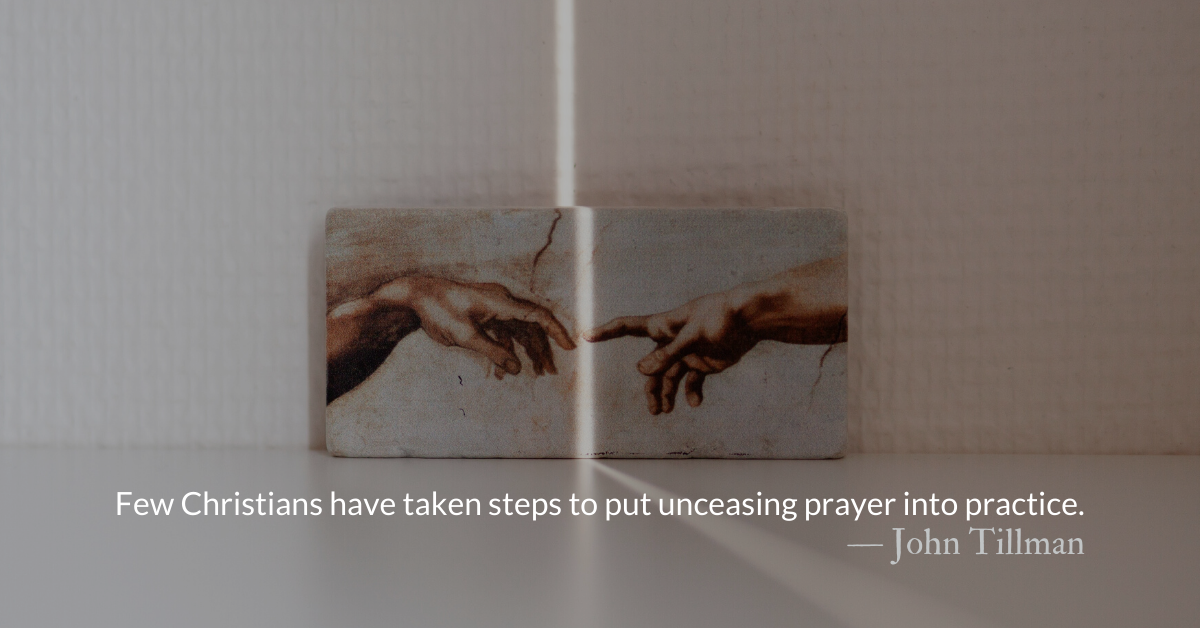Scripture Focus: Proverbs 21.1.2
In the Lord’s hand the king’s heart is a stream of water
that he channels toward all who please him.
A person may think their own ways are right,
but the Lord weighs the heart.
Colossians 4.2
Devote yourselves to prayer, being watchful and thankful.
Reflection: Examine the Examen
By John Tillman
The Examen is not a prayer to change your prayer life but to change the rest of your life. The Prayer of Examen, first recorded by St. Ignatius, is a prayer that has been used throughout the Church since the 16th century. The Examen, like a good tutor, schools us in practicing the presence of God.
In this prayer, we reflect on our day, find God in the midst of everyday life, assess our motives, desires, struggles, and opportunities, and move forward into the future with repentance, faith, thankfulness, and joy.
There are many versions of the Examen. We have, over the years, published and used different versions of the prayer ourselves, including the version at this link. I have studied and used versions of the prayer from different writers and my own church pastors and find each iteration to be helpful. The Examen can be customized to fit the way you communicate with God, the time you give to it, and how you implement it and get it in your memory. The simplest, shortest way to summarize the Examen may be the following five words:
Awareness
Analysis
Admission
Acceptance
Anticipation
Below, let us follow a version of the Examen specifically adapted to the realities of life in a time of quarantine and social distancing.
Awareness:
Take a few moments to relax and release your mind from any concerns that you are holding on to. Just pause. Realize you are in God’s presence and have been continually. Even alone in your home (or surrounded and crowded by your sequestered family…), he is in our midst.
Once settled peacefully, thank God for his presence and ask for his grace to be more aware of him, especially in the next few minutes.
Analysis:
Review the past day and God’s presence with you. We may be socially distant from our friends and community, but God is not distant. When did you sense him? What opportunities did you take to interact with or act on behalf of Jesus?
Celebrate moments in which Christ’s grace, love, and righteousness shone through you. Humbly acknowledge that these moments were empowered by the Holy Spirit and not yourself.
Admission:
You will also recall shortcomings and failures. Confess sins with the knowledge that Jesus has forgiven you. Confess not just actions of sin, but motivations behind them. (Not just that you shouted in anger but that you have an unhealthy desire for dominance and control rooted in a failure to trust God…)
Acceptance:
Celebrate your forgiveness, reinstatement, and acceptance through Jesus. The good news, the gospel, is that although we fail consistently, in Christ, we are loved, accepted, and forgiven continually and that Christ is at work in and through us for our sanctification and perfection.
Anticipate:
Look forward to tomorrow, with faith and anticipation of the presence of Christ going before you and being with you.
Ask for grace to be more aware of his presence with you going forward, and close with the Lord’s prayer or another prayer chosen from scripture.
Our Father in Heaven, holy is your name.
Your kingdom come and your will be done on earth as it is in heaven.
Give us today our daily bread.
Forgive us our debts as we forgive our debtors.
Lead us not into temptation but deliver us from evil. Amen.
Divine Hours Prayer: The Request for Presence
Lead me, O Lord, in your righteousness,… make your way straight before me. — Psalm 5.8
– Divine Hours prayers from The Divine Hours: Prayers for Springtime by Phyllis Tickle.
Today’s Readings
Proverbs 21 (Listen 3:12)
Colossians 4 (Listen -2:21)
Read more about Presence is Precious
The presence of God is a precious thing…Moses tells God, “If your Presence does not go with us, do not send us…”
https://theparkforum.org/843-acres/presence-is-precious/
Read more about Recalling the Failures
Christ sees more failure in us than even we know, yet he re-calls us—he calls us to himself again, and again, and again. Christ re-calls the failures.






